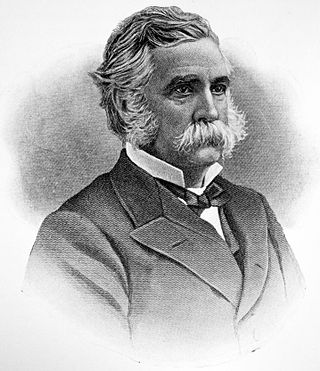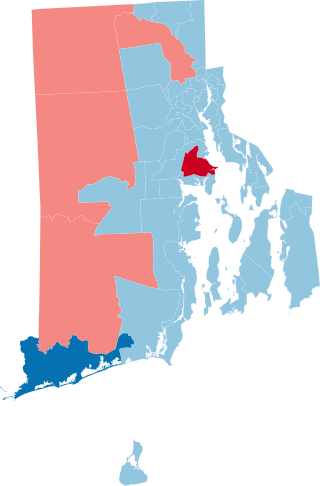
Lincoln Davenport Chafee is an American politician. He was mayor of Warwick, Rhode Island, from 1993 to 1999, a United States Senator from 1999 to 2007, and the 74th Governor of Rhode Island from 2011 to 2015. He was a Democrat from 2013 to 2019; in 2019, he became a Libertarian, having previously been a Republican until September 2007 and an independent and then a Democrat in the interim. He is the last non-Democrat to hold statewide and/or Congressional office in Rhode Island.

Herbert Warren Ladd was the 40th and 42nd Governor of Rhode Island for two terms: 1889–90 and 1891–92.

The 1912–13 United States Senate elections were held on various dates in various states. They were the last U.S. Senate elections before the ratification of the Seventeenth Amendment in 1913, establishing direct elections for all Senate seats. Senators had been primarily chosen by state legislatures. Senators were elected over a wide range of time throughout 1912 and 1913, and a seat may have been filled months late or remained vacant due to legislative deadlock. Some states elected their senators directly even before passage of Seventeenth Amendment. Oregon pioneered direct election and experimented with different measures over several years until it succeeded in 1907. Soon after, Nebraska followed suit and laid the foundation for other states to adopt measures reflecting the people's will. By 1912, as many as 29 states elected senators either as nominees of their party's primary or in conjunction with a general election.

John William Davis was a United States Democratic politician, who served as the 38th and 41st Governor of Rhode Island.
Since the Great Depression, Rhode Island politics have been dominated by the Rhode Island Democratic Party, and the state is considered part of the Democrats' "Blue Wall." Democrats have won all but four presidential elections since 1928, with the exceptions being 1952, 1956, 1972, and 1984. The Rhode Island Republican Party, although virtually non-existent in the Rhode Island General Assembly, has remained competitive in gubernatorial elections, having won one as recently as 2006. Until 2014, Democrats had not won a gubernatorial election in the state since 1992, and it was not until 2018 that they won one by double digits. The Rhode Island General Assembly has continuously been under Democratic control since 1959.

The 1840–41 United States Senate elections were held on various dates in various states. As these U.S. Senate elections were prior to the ratification of the Seventeenth Amendment in 1913, senators were chosen by state legislatures. Senators were elected over a wide range of time throughout 1840 and 1841, and a seat may have been filled months late or remained vacant due to legislative deadlock. In these elections, terms were up for the senators in Class 2.

The 1802–03 United States Senate elections were held on various dates in various states. As these U.S. Senate elections were prior to the ratification of the Seventeenth Amendment in 1913, senators were chosen by state legislatures. Senators were elected over a wide range of time throughout 1802 and 1803, and a seat may have been filled months late or remained vacant due to legislative deadlock. In these elections, terms were up for the senators in Class 1.

The 1862–63 United States Senate elections were held on various dates in various states, occurring during the American Civil War. As these U.S. Senate elections were prior to the ratification of the Seventeenth Amendment in 1913, senators were chosen by state legislatures. Senators were elected over a wide range of time throughout 1862 and 1863, and a seat may have been filled months late or remained vacant due to legislative deadlock. In these elections, terms were up for the senators in Class 1.

The 2012 United States presidential election in Rhode Island took place on November 6, 2012, as part of the 2012 United States presidential election in which all 50 states plus the District of Columbia participated. Rhode Island voters chose four electors to represent them in the Electoral College via a popular vote pitting incumbent Democratic President Barack Obama and his running mate, Vice President Joe Biden, against Republican challenger and former Massachusetts Governor Mitt Romney and his running mate, Congressman Paul Ryan.

The 2014 Rhode Island gubernatorial election took place on November 4, 2014, to elect the governor of Rhode Island, concurrently with the election of Rhode Island's Class II U.S. Senate seat, as well as other elections to the United States Senate in other states and elections to the United States House of Representatives and various state and local elections.

The 2014 United States Senate election in Rhode Island was held on November 4, 2014, to elect a member of the United States Senate from the State of Rhode Island, concurrently with the election of the governor of Rhode Island, as well as other elections to the United States Senate in other states and elections to the United States House of Representatives and various state and local elections.
Kenneth J. Block is an American businessman, software engineer, and political reformer. He is the founder of the Moderate Party of Rhode Island, the state's third-largest political party, and ran as the Moderate candidate for Governor of Rhode Island in the 2010 election.

A general election was held in the U.S. state of Rhode Island on November 4, 2014. All of Rhode Island's executive officers went up for election as well as a United States Senate seat and both of Rhode Island's two seats in the United States House of Representatives. Primary elections were held on September 9, 2014.

The 1924 United States presidential election in Rhode Island took place on November 4, 1924, as part of the 1924 United States presidential election which was held throughout all contemporary 48 states. Voters chose five representatives, or electors to the Electoral College, who voted for president and vice president.

The 1888 Connecticut gubernatorial election was held on November 6, 1888. Republican nominee Morgan Bulkeley defeated Democratic nominee Luzon B. Morris with 47.94% of the vote.

The 1891 Rhode Island gubernatorial election was held on April 1, 1891. Democratic incumbent John W. Davis received 48.95% of the vote and Republican nominee Herbert W. Ladd 46.19%. With no candidate attaining a majority of the vote it was decided by the Rhode Island General Assembly The Republican majority selected Ladd.

The 1890 Rhode Island gubernatorial election was held on April 2, 1890. Democratic nominee John W. Davis defeated incumbent Republican Herbert W. Ladd with 48.76% of the vote.

The 1876 Rhode Island gubernatorial election was held on April 5, 1876. Incumbent Republican governor Henry Lippitt defeated Prohibition Party nominee Albert C. Howard and Democratic nominee William B. Beach.

The 2022 Rhode Island State Senate elections took place on November 8, 2022. Primary elections were held on September 13, 2022. Rhode Island voters elected state senators in all 38 seats of the Senate. State senators serve two-year terms in the Rhode Island Senate.



















